Original work has 67 slokas. We have selected only those
applicable to Spiritual subject.This work, in the form of
questions and answers, provides concise, pithy definitions of
those eternal values which form the foundations of sanatana
dharma and which transcend all limitations of time and space.

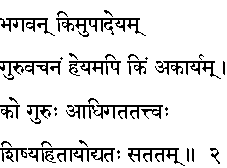 | 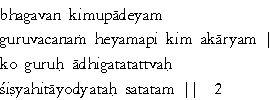 |
Verse 2 - Meaning:
Q: What deserves full and unquestioned acceptance ?
A:The instructions and orders of the Guru (guru vachanam)
Q: What is to be rejected?
A: Those things that one should not do or what is evil.[akaryam is the negative part of karyam which is any normal duty that one is permitted to do]
Q: Who can be considered as a Guru (the spiritual teacher)?
A: That one who knows the truth, who lives in and as truth and who always (satatam) strives for the good of his (hita) disciple(s) (sishya).
Verse 3 - Meaning:
Q: What (kim) is the immediate duty (kartavyam) and binding of a truly learned man ? A: To try and succeed in terminating the ever-revolving cycle of births and deaths.(samsaara santati - is this vicious cycle) Q: What is the seed (bijam) of the tree (taru) of liberation (moksha)?
A: The attainment of perfect and true knowledge (samyak-jn~anam) and its application in everyday life(kriyaa-siddham)
Verse 4 - Meaning:
Q:What is the most beneficial thing ?(kah pathyataro) A:Dharma, or the path of righteousness is. Q: Who is the clean person ? (kah sucir-iha) A: That one whose mind(maanasam) is pure(suddham). Q: Who is the real intelligent person? (kah pandito) A:That one who is endowed with the power of discrimination(viveki). Q: What is poison ? (kim visham) A:Not abiding by the advice of wise, elderly people. (avadhirana gurusu). | |||||||
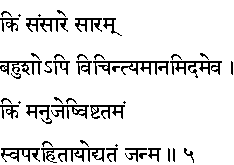 | 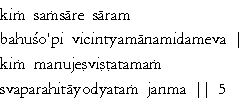 |
Verse 5 - Meaning:
Q: What is the essence of this(illusory) life that we are leading ?(kim samsaare saaram)
A:The understanding that it is only transitory and will not last forever.
Q: What can be considered as the dearest thing for a man ?
A:The leading of a life that is entirely devoted to the good (and only good) of himself(sva) and others(para).
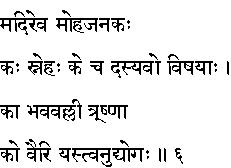 |  |
Verse 6 - Meaning:
Q: What spoils the mind(madhi) and brings down its efficiency like an alcoholic drink ?
A: Love(or) Friendship(snehah) of the abnormal or extreme kind.
Q: What can be considered as thieves in a man ?
A: The Sense Objects that bog down the mind from its higher faculties(vishaya).
Q: What is the nature of the bhava(sagaram) , the vicious cycle of births and deaths ?
A: It is the continuing thirst of desires
.
Q: Who is the enemy ? (ko vairi)
A: An idle disposition.
Q: Who is the enemy ? (ko vairi)
A: An idle disposition.
Verse 11 - Meaning:
Q: What is in such a flux and so temporary and ever-changing like water drops on a lotus
leaf ?
A: Youth, Wealth and life-span are those.(yauvanam, dhanam and caayuh - respectively) Q: Who is cooling and full of ever-present radiance like the moonlight ? A: It is the saintly ones. (saj-jana)
Verse 13 - Meaning:
Q: What is the cause of disappointment ? A: Inordinate self-estimation. Q: What endows one with happiness ? A: Friendship(or keeping in touch) with the holy and saintly ones. Q: Who is the most skilled one in destroying all forms of sorrows ? A: That one who has renounced everything in all aspects.
Verse 16 - Meaning:
Q: What should one always think of(in his mind) throughout day and night ? (kahar nisam anu-cintya) A: About the non-permanance of the worldly and materialistic life and certainly not about thoughts that give sexual excitement. Q: What should be one's favorite duty in life ? A: Being kind to all the suffering living beings and making friendship with the honest and holy men. (karuna - diineshu, saj-jana maitri ) [karuna-kindness; diina - suffering ones; maitri-friendhip]
Verse 17 - Meaning:
Q: What kind of people cannot be put in the right course of life even by force? A: The habitual rowdy, the one who is always doubtful of everything, the irreversibly pessimistic and the ungrateful ones. | |||||||||||
Verse 24 - Meaning:
Q: What(kim)is rare in this world(dur-labham iha) like the Chintaamani(a rare jewel referred to in Hindu scriptures which is supposed to be yielding one's wishes)? A: I shall mention four auspicious entities(chatur - viseshena) in this respect, that being the view of enlightened men. | |||||
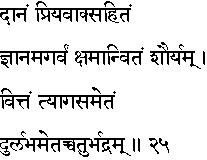

Verse 25 - Meaning:
A: (In continuation of answer given to earlier verse No 24)
These are gifts(daanam) given with courteous words(priya vaak sahitam), scholarship(jnaanam) without pride(a-garvam), bravery(sauryam) coupled with forgiveness(kshamaanvitam) and wealth(vittam) spent in charity (tyaaga sametam).
These(etat) four(chatur bhadram) are indeed rare.(dur-labham)
A: (In continuation of answer given to earlier verse No 24)
These are gifts(daanam) given with courteous words(priya vaak sahitam), scholarship(jnaanam) without pride(a-garvam), bravery(sauryam) coupled with forgiveness(kshamaanvitam) and wealth(vittam) spent in charity (tyaaga sametam).
These(etat) four(chatur bhadram) are indeed rare.(dur-labham)
Verse 28 - Meaning:
Q: What(kaa) attracts(manohara) the mind of the learned ? (vidvan) A: Literary compositions without a blemish(sat-kavitaa) and the damsel of masterly intelligence(bodha vanitaa ca) Q: Who(kam) can save himself from calamities ? (na sprsati vipattih) A: That one who follows the advice of wise men(pravrddha vacana) and who exercises control over the senses.(anuvartinam daantam) | |||||
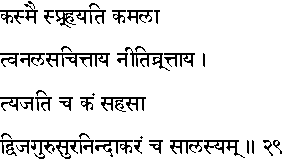 |  |
Verse 29 - Meaning:
Q: To whom is the Goddess of prosperity attracted ? (kasmai sprhayati kamalaa)
A: To that one who is ever industrious(tvanalasa-cittaaya) and just. (niiti-vrttaaya)
Q: Whom(kam) does she desert promptly ? (tyajati-sahasaa)
A: That one who is lazy(saalasyam) and shows no regard for Devas(sura), Elders(guru), and Holy men. (dvija - nindaakaram)
Verse 33 - Meaning:
Q: What(kim) should be the subject of one's thought, (ahar-nisam) day and night ?(anu-cintyam) A: The lotus feet of the Supreme Being(Bhagavac-caranam) and certainly not(na) the worldly matters.(samsaarah) Q: Who should be considered as blind (caksus-manto) though having eyes? (apyandhaah - ke syuh) A: Those who do not have faith in God. (ye naastikaa manujaah) | |||||
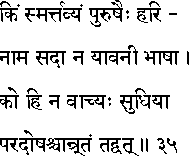 |  |
Verse 35 - Meaning:
Q: What (kim) is fit to be remembered (smartavyam) always by man ? (purusaih)
A: The Holy Name of the Lord(Hari-naama) always(sadaa), and not(na) the speech(bhaasaa) of the unregenerate ones. (yaavanii)
Q: What(ko) should a wise man(sudhiya) avoid speaking ? (na-vaacyah)
A: Talking about others' faults(para-doshaa) and speaking falsehood(caanrtam tadvat)
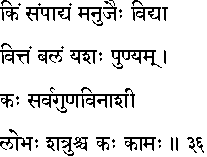 |  |
Verse 36 - Meaning:
Q: What(kim) should a man's(manujaih) earnings (sampaadyam) be comprised of ?
A: In knowledge(vidyaa), wealth(vittam), strength(balam) , fame(yasah) and holiness.(punyam)
Q: What(kah) destroys(vinaasii) one's merits(sarva-guna) entirely ?
A: Greed(lobhah)
Q: What(kah) is one's enemy (satru) ?
A: Sexuality(kaamah)
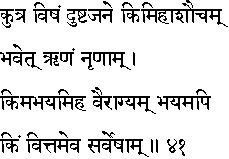 |  |
Verse 41 - Meaning:
Q: Where(kutra) is the receptacle of poison(visham) ?
A: In the mind of evil men. (dushta-jane)
Q: What(kim) gives(bhavet) that kind of impurity-consciousness(asaucam) which makes one avoid others ?
A: The state of indebtedness. (rnam-nrnaam)
Q: What(kim) makes a man fearless ? (abhayam)
A: The state of non-attachment.(vairaagyam)
Q: What(kim) is the cause of fear(bhayam-api) ?
A: It is wealth(vittam), indeed.
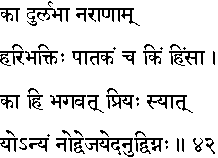 |  |
Verse 42 - Meaning:
Q: What(kaa) is the rarest virtue(dur-labhaa) in man (naraanaam) ?
A: Love of God. (hari-bhaktih)
Q: What(kim) is sinful(paatakam) ?
A: Oppression of others(including tiny creatures). (himsa)
Q: Who is(ko hi) dear(priyah-syaat) to the Lord ? (bhagavat)
A: That one(yo) who does not get angry(anyam-n-odvejayed), nor causes others to get angry.(anudvignah)
Verse 43 - Meaning:
Q: What causes(kasmaat) success(siddhih) ? A: Concentrated efforts or the(tapas)
.
Q: Whose(kva) mind(buddhih) is always on the right track ? A: Of one who honours holy men. (bhuu-sur-e) Q: How is this state of mind produced(kuto buddhih) ? A: Through respect for the advice of wise and elderly men.(vrddhopa-sevayaa) Q: Who is an elderly man(as talked about above) (ke vrddhaa) ? A: One who knows the essence of Dharma(morality). (ye-dharma-tattvajnaah) | |||||
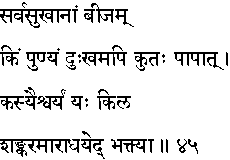 |  |
Verse 45 - Meaning:
Q: What(kim) is the source or seed(biijam) of all happiness (sarva-sukhaanaam) ?
A: The merits of one's good actions.(punyam).
Q: What causes(api kutah) misery(duhkham) to a man ?
A: One's sins.(paapaat)
Q: How does one get endowed with(kasya) Lordliness (aisvaryam) ?
A: Only by the(yah kila) devoted worship(aaraadhayed bhaktyaa) of Sankara (God) (sankaram).
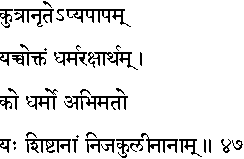 |  |
Verse 47 - Meaning:
Q: When can(kutra) telling an untruth(anrte) be considered not a sin ? (apya-paapam)
A: When that is the one and only way(yaccoktam) to protect one's Dharma. (dharma-rakshaartham).
Q: What is(ko) Dharma?
A: The traditions(yah-sishtaanaam) that one's respected ancestors(abhimato) have observed. (nija-kuliinaanaam)
Verse 48 - Meaning:
Q: What(kim) is the source of strength (balam) for a Saadhu ? A: God. (daivam) Q: Who is(kah) a Saadhu? A: That one who is ever(sarvadaa) satisfied.(tushttah)
Q: What(kim) is one's Fate? (daivam)
(Note: Here, "daivam" is used to connote the controlling force or power in one's life) A: One's own meritorius actions. (yat-sukrtam) Q: Who(kah) is to be identified as one with meritorius actions to his credit ? (sukrti) A: That one who has the approval and admiration (slaaghyate) of virtuous men. (yah-sadbhih) | |||||
Verse 51 - Meaning:
Q: Who(ko) is endowed with abundance(dhanyah)?
A:A Sannyaasi - or the one who has renounced everything. (samnyaasii)
Verse 52 - Meaning:
Q: What(kim) is the greatest good fortune(bhaagyam) for an embodied being(dehavataam)? A: Sound Health. (aarogyam) Q: Who(kah) reaps the fruits(phalii) ? A: That one who works well in his field. (krsikrt) Q: Who(kasya) will be free from sins(na-paapam)? A: One who continuously repeats(japatah) the name of the Lord
.
Q: Who(kah) has attained fulfilment(puurno) ? A: He who(yah-syaat) has a virtuous progeny(prajaavaan) | |||||
Verse 53 - Meaning:
Q: What(kim) is the most difficult thing(dushkaram) for a man to do(naraanaam) ? A: To keep the mind(yan-manaso) always(satatam) under control. (nigrahah) Q: Who(ko) can be considered as a true Brahmachari (brahmacaryavaan syaat) ? A: That one whose libido has been sublimated. (yasca-askhalti-ordhva-retaskah) | |||||
Verse 54 - Meaning:
Q: Who is the(kaa ca) most Adorable Being(para-devat-okta) ? A: The power of Pure-Consciousness(cit-sakthih) also known as the "Bhagavati" swarupa in Hindu mythology. Q: Who(ko) is the ruler(bhartaa) of the Universe(jagat) ? A: The Sun(suuryah) God(by whose light and heat all living beings are able to live).
Q: What(ko) causes and sustains(jiivana-hetuh) all life (sarveshaam) ?
A: Rain(sa-parjanyah). | |||||
Verse 55 - Meaning:
Q: Who is(kah) a hero(suuro) ? A: He(yo) who gives protection(traata) to the frightened ones. (bhiita) Q: Who(kah) is a true protector(traataa-ca) ? A: A spiritual teacher(sad-guruh) or the perfect teacher, who can be likened to God. Q: Who is(ko hi) the spiritual teacher(gurur-uktah) for the whole world (jagat) ? A: It is "Sambhu", the Supreme Being. Q: From whom(kutah) does one acquire knowledge (jnaanam) ? A: From Siva indeed. (sivaad-eva) | |||||
Verse 56 - Meaning:
Q: How is(kasmaat) liberation(muktim) attained(labheta) ? A: By whole-hearted devotion(bhakteh)to "Mukunda" or the Supreme Being. Q: Who(kah) is "Mukunda" ? A: It is the Being who enables Jiivaas to overcome(yas-taarayed) the sea of Ignorance(avidyaam). Q: What is(ka ca) Ignorance(Avidya) ? A: It is the state of absence of the full knowledge (a-sphuurtih) of one's true self(aatman) | |||||
Verse 58 - Meaning:
Q: Who(ko) is the Lord of Maayaa(maayii) ? A: The Supreme Being.(parameshah) Q: What(kim) is true magic(indra-jaalaa-yate) ? A: This ever-changing Universe.(prapanco-ayam)
.
Q: What(kah) resembles a dream experience(svapna-nibho) ? A: The activities(vyavahaarah) of the waking(jaagrad) life. Q: What is(kim - api ca) the True Being(satyam) ? A: It is Brahman(the Supreme Being which is not destroyed even in absolute annihilation). | |||||
Verse 59 - Meaning:
Q: What(kim) is falsity(mithyaa) ? A: That which disappears(yad-naasyam) without a residue when true knowledge(vidyaa) dawns. Q: What(tu) is called a wordy fiction(tuccham) ? A: The horn of a hare and similar other entities like sky-flower. (sasa-visaanaadi). Q: What(ka-ca) is it that cannot be determined as true or untrue(anirvaacyaa) ? A: It is "Maayaa" which is just a superimposition but non-existent
.
Q: What(kim) is the superimposed(kalpitam) ? A: It is the aspect of Duality.(dvaitam) | |||||
Verse 60 - Meaning:
Q: What(kim) is really real(paaramaarthikam) ? A: Non-Duality or Advaitam ie,BRAHMAN only Q: How does ignorance(a-jnaata) arise(ca- kuto) in one ? A: It does not arise since it has always been existing. In other words, it is beginningless or Anaadi. Q: What(kim) sustains(poshakam) the body(vapusas-ca) ? A: It is the operative quantum of Karma (Praarabdha Karma) Q: What(kim-ca) gives us food(anna-daayi) to sustain life ? A: Longevity or the span of life(caayuh) with which Praarabdha has endowed one. | |||||
Verse 61 - Meaning:
Q: What(ko) should a wise man(braahmanair) commune with in worship(upaasyo) ? A: With Sambhu(or the God) denoted by the Gayatri Mantra, the Sun and the Fire as symbols for communion.(gaayatry-arkaagni-gocarah-sambhuh) Q: What is the common thread linking Gayathri, the Sun, the Fire and Sambhu ? (gaayatryaam-aaditye-ca-agnau sambhau ca kim nu) A: Their Essence(tattvam) is the same. | |||||
Verse 62 - Meaning:
Q: Who(kaa) is the visible God(pratyaksha Devataa) for one ? A: The mother(maataa) that bore one.
l
Q: Who is(kah-ca) the elder(guru) that should always be respected ? (puujyo) A: One's father. (taatah) Q: Who(kah) is the embodiment(atma) of all(sarva) divinities (devata) ? A: A wise man who has achieved the fulfilment(anvito-viprah) of all learning(vidya) and holy acts. (karma) | |||||
Verse 64 - Meaning:
Q: What(kim) is the cause of birth(janma) ? A: Attachment(samgah) to objects(vishaya) of enjoyment. Q: What(kim) is one's second(uttaram) embodiment(janma) ? A: It is one's son. (putrah-syaat)
.
Q: What(ko) is un-avoidable(a-parihaaryo) ? A: Death(mrtyuh) . Q: Where should(kutra padam) one take one's place (vinyasec-ca) ? A: In a place which one can see directly(drk) as pure.(puute) . | |||||
Verse 66 - Meaning:
Q: What(kim) is the reward for(phalam-api) devotion(bhakteh) to the Lord(bhagavad) ? A: The actual realisation(saakshaattvam) of His Divine(tal-loka) Realm. (svaruupa) Q: What is(ko-ca) liberation(moksha) ? A: The ending(astamayah) of Ignorance. (hy-avidyaa) Q: What(kah) is the source and dissolving centre(bhuuh) of all Veda(sarva-veda) ? A: It is(atha-ca) the indeclinable sound Om or AUM. (Om is the pranava mantra - also spelled as AUM) . | |||||
Verse 67 - Meaning:
One whose neck,(ity-esaa) the source of voice(kanthasthaa) is adorned with this Prasnottara-ratna-maalika, will shine in the assembly of the wise, as if he is wearing a necklace of pearls (te-muktaabharanaa iva). He will shine like a pure luminous body(vimalaascaabhaanti) in the assembly of the wise(sat-samaajesu) . | |||||
================================

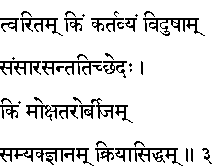

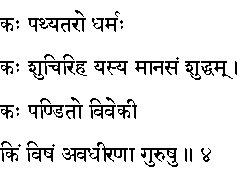
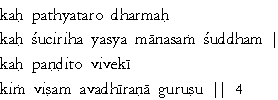
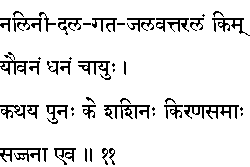

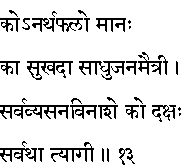
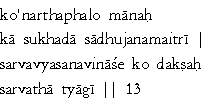
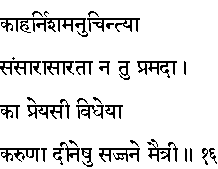
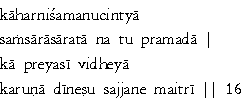
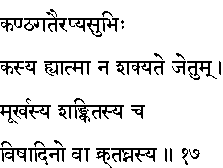
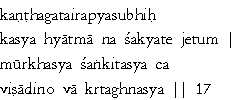
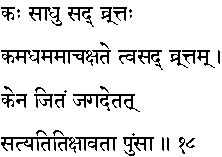

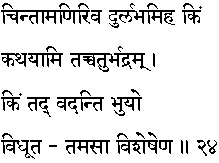

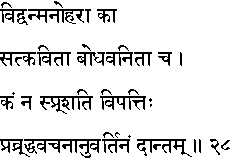

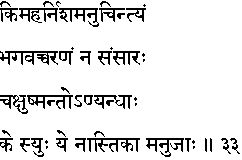

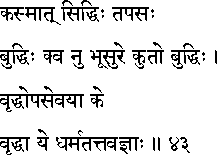

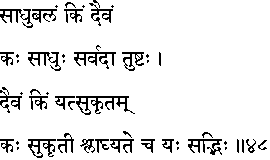

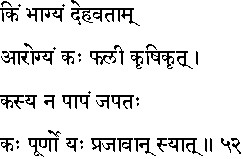

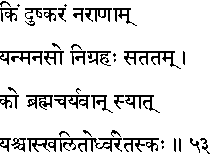

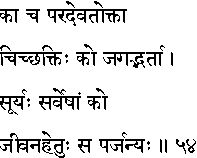

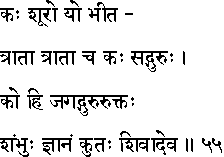

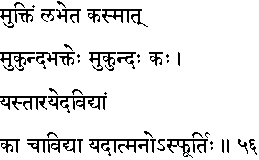

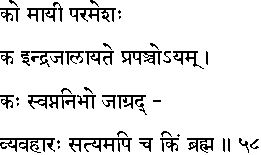

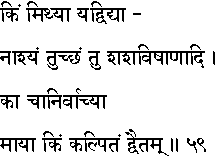

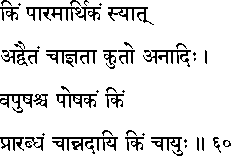

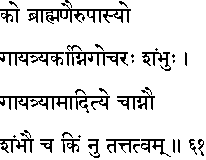

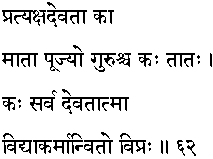

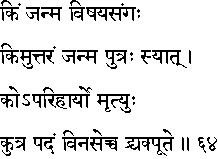

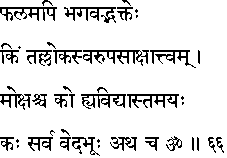

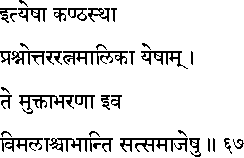

PLEASE SEE OUR VERY FIRST POSTING--'ALL ABOUT GURU', IT SAYS--
ReplyDelete"A jnani cannot think he is a GURU !!
He sees ATHMA IN ALL.So there is no GURU nor SHISHYA for him.
A sadhaka can think somebody as his GURU.
In reality when a sadhaka needs a GURU,GOD takes the form of GURU.
GURU cannot give MOKSHA to a person.He can only guide and show the path."
AS THE SELF REALISED JNANI DOES NOT THINK HIMSELF AS GURU, QUESTION OF
'GURU DIKSHA' GIVING DOES NOT ARISE!!
----ATHMA